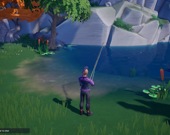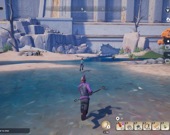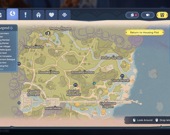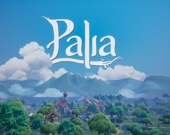Palia Game Review
From the very announcement of this game, millions of gamers have been following it. There are several reasons for this excitement. First of all, the development involved industry veterans - former employees of Blizzard, Epic Games and Riot Games, who decided to found Singularity 6 studio to realize their own ideas. Secondly, Palia is an unusual MMO. Technically, there is a large world here, populated by characters of other users. But the heroes do not fight for any fortresses and do not settle relationships in duels. Instead, they are engaged in building virtual estates, weeding beds in the vegetable garden, fishing, crafts and other things that require neither belligerence nor special skill. We find out what the novelty of 2024 is interesting.
Familiarity with the game
To get into the fairy-tale world, you only need to specify your e-mail. Everything else is available for free, and the game does not sin with intrusive offers to buy something in the digital shop. However, there are still paid clothes here - if you want to decorate your character like a Christmas tree, you will be given a lot of options at a reasonable price. But first you have to create a character. Despite the simple graphics, somewhat reminiscent of World of Warcraft, there is a huge number of appearance settings - from the shape of eyebrows and hair color to accessories. You can run around with an orange mustache and purple Mohawk. According to the current fashion, the gender here is replaced by "body type", but the essence is the same: you can make a guy, a girl, or a girl with a luxurious beard, if you like it so much.
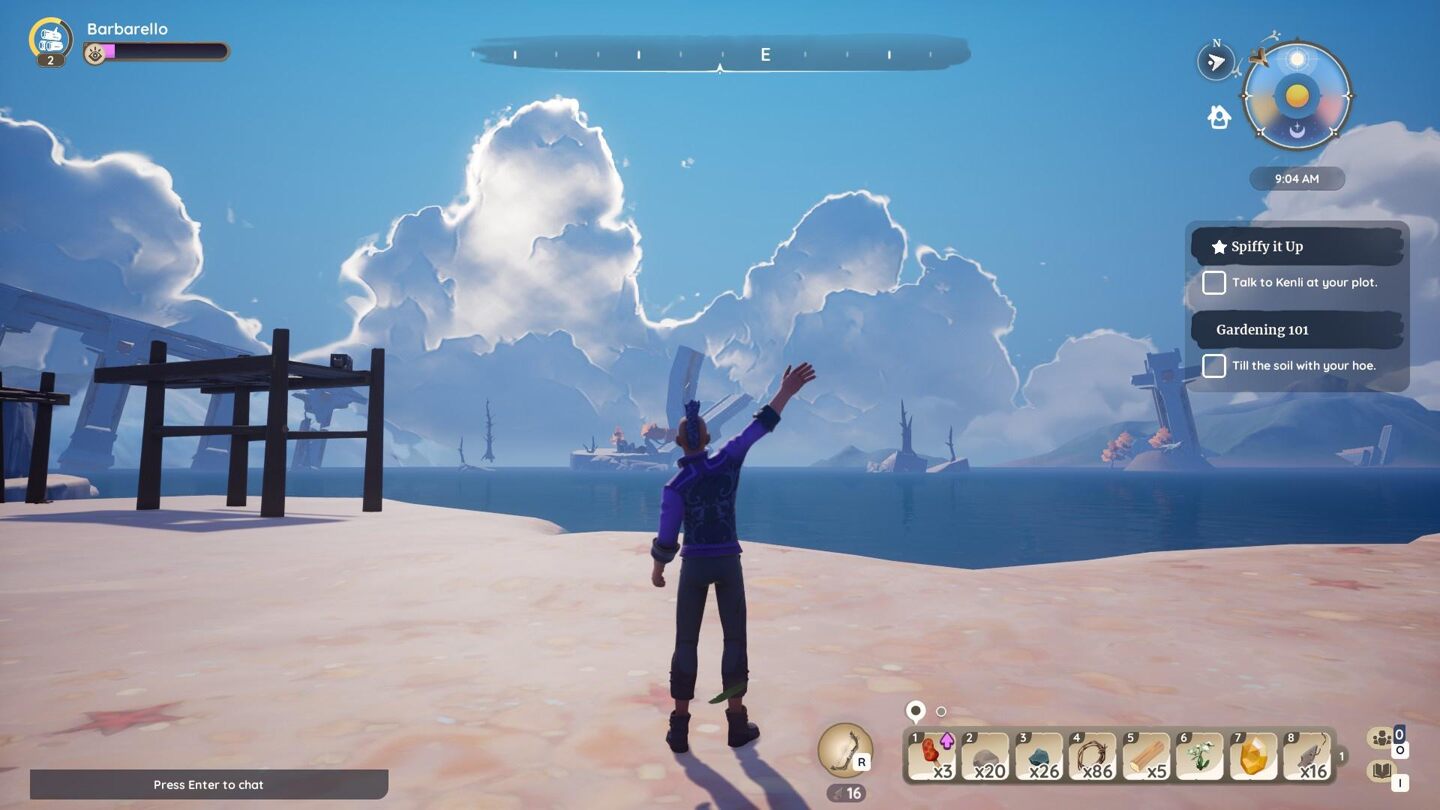
The action unfolds in the Valley of Kilim - a land of elves with lilac skin and pointy ears. These kindly folk thought the human race was long extinct, until your hero - a real man from another world - came to them. The portal, which for a moment connected the two dimensions, immediately disappeared, and no one can explain its action. It is only known that from time to time in the ruins of the ancient human temple strange things happen - and this time the main strangeness was an uninvited guest. But there's nothing to do, elves are famous for their hospitality, so you are given a brief lecture on local customs, introduced to some characters and allocated an acre of land in the vicinity of the city. And then they hand you an axe and a pickaxe and offer you to make your own nest.
The plot of land, even if it was given for free, should be managed in an owner's way. Break stone rubble with a pickaxe, chop piles of boards for building materials, collect wild fruits - in a word, prepare the plot for construction. After all, on it you will need to place housing (at first a tent, and then the house), workbench, kitchen and other equipment, and also divide the land into beds and sow the soil to grow something useful. Components for construction are taken here as well - by destroying any object, you immediately get its components in your inventory. And in the process of dismantling the trash suddenly find a mysterious artifact, which begins the progression of the plot - you need to investigate what this thing is, involving a variety of specialists.
The plot of land, even if it was given for free, should be managed in an owner's way. Break stone rubble with a pickaxe, chop piles of boards for building materials, collect wild fruits - in a word, prepare the plot for construction. After all, on it you will need to place housing (at first a tent, and then the house), workbench, kitchen and other equipment, and also divide the land into beds and sow the soil to grow something useful. Components for construction are taken here as well - by destroying any object, you immediately get its components in your inventory. And in the process of dismantling the trash suddenly find a mysterious artifact, which begins the progression of the plot - you need to investigate what this thing is, involving a variety of specialists.
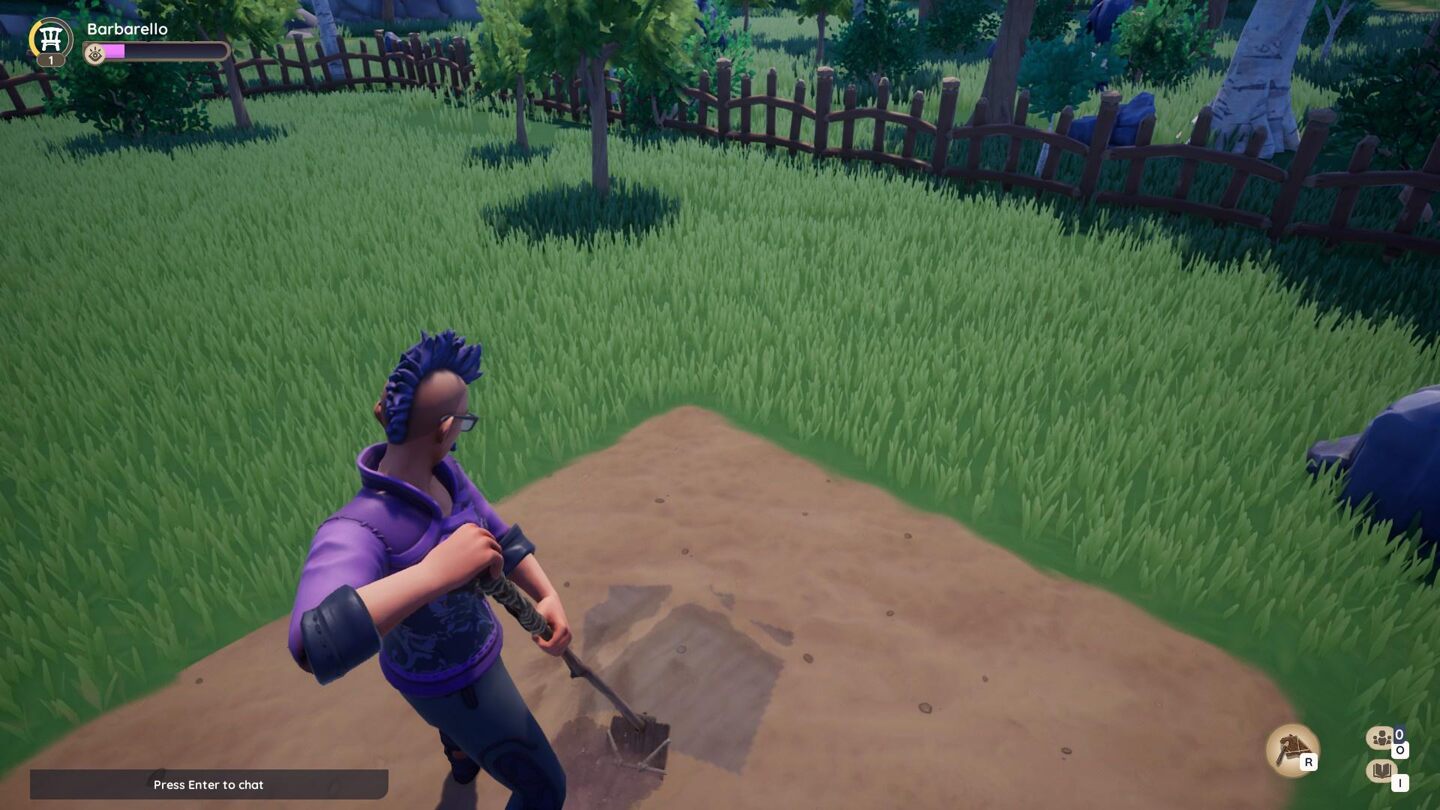
Most of the quests boil down to going somewhere, talking to someone and then doing something, but again, no fighting. As you progress through the quests, you are unlocked more and more complex recipes that take time to assemble items. Almost all serious crafting is timed - building a house, for example, requires eight real hours. Fortunately, there are a variety of activities to help shorten the long wait - from fishing and hunting to collecting bugs. Those who feel adventurous can go to ruins or dungeons, where you have to solve simple puzzles and discover the secrets of the past. Why, say, from the world of Palia disappeared all the people? Ancient inscriptions and artifacts will tell you the answer.
It is also worth noting that the game is actually a bit more serious than it seems at first glance. Here the imitation of agriculture is thought over: you need not only to weed the vegetable garden, but also to water it, and also to find sprouts and seeds. In Palia you can't raise birds without eggs, you can't cook food without fire, and you can't catch fish without bait. In the virtual world there is a change of day and night, and some characters under the control of artificial intelligence at night sleep in their huts, instead of wandering anywhere. Climbing on ledges and crawling on vines, your hero spends his stamina reserve - you should keep an eye on it too, though you don't need stamina for running. And it's great, because the map is spacious and sometimes you can run from one end to the other. There is fast travel for gold coins, but here everyone decides whether to exchange currency for speed.
It is also worth noting that the game is actually a bit more serious than it seems at first glance. Here the imitation of agriculture is thought over: you need not only to weed the vegetable garden, but also to water it, and also to find sprouts and seeds. In Palia you can't raise birds without eggs, you can't cook food without fire, and you can't catch fish without bait. In the virtual world there is a change of day and night, and some characters under the control of artificial intelligence at night sleep in their huts, instead of wandering anywhere. Climbing on ledges and crawling on vines, your hero spends his stamina reserve - you should keep an eye on it too, though you don't need stamina for running. And it's great, because the map is spacious and sometimes you can run from one end to the other. There is fast travel for gold coins, but here everyone decides whether to exchange currency for speed.
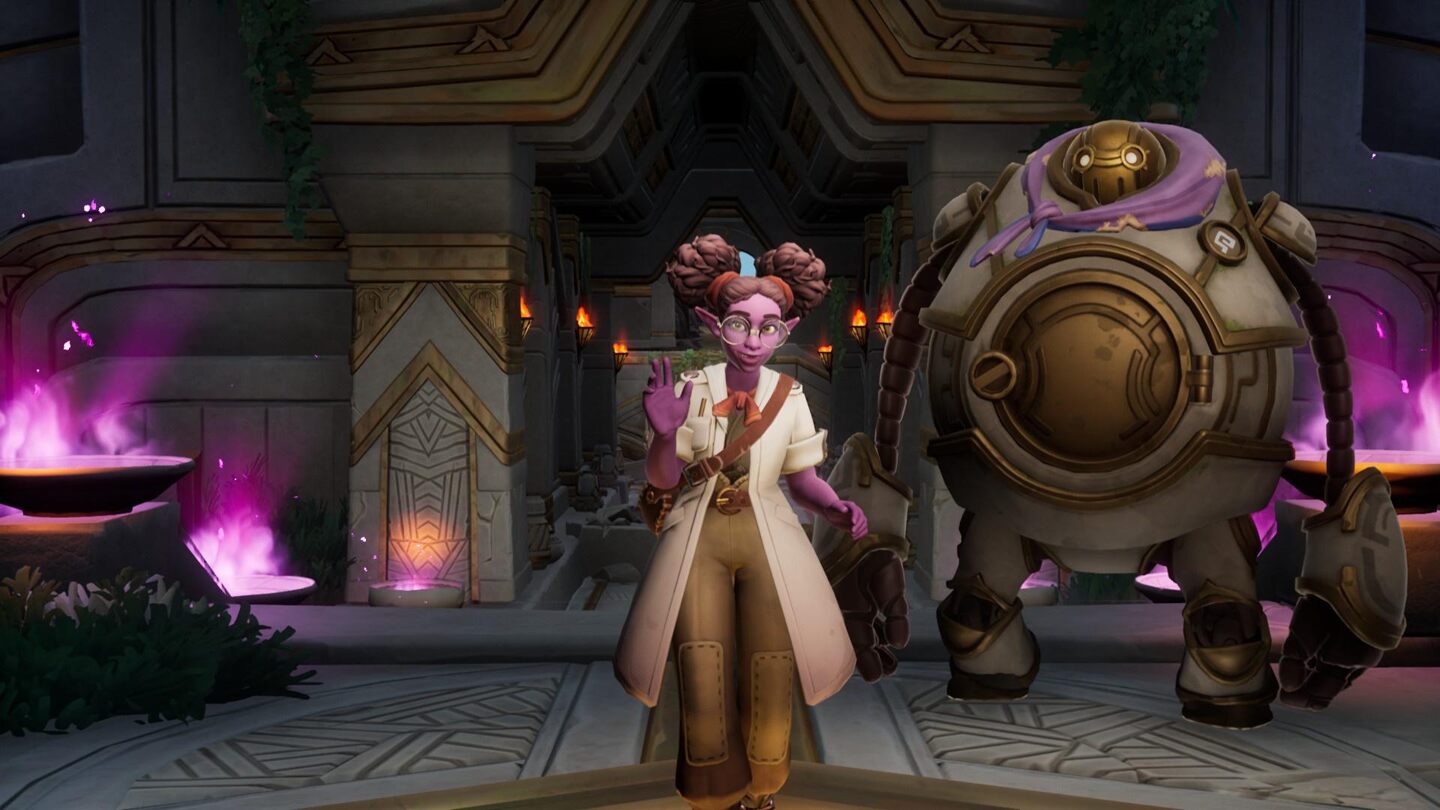
An interesting feature of the game is the relationship with NPCs, i.e. computer characters - those very sharp-eared elves with lilac skin. With any (or any) of them you can not only make friends, but also have a romance. Especially for this purpose in the dialog window there are several options for responses - from neutral phrases to those that clearly like the interlocutor. As you communicate, your friendship grows stronger. And having pumped it up to the third level, you can move on to the next stage - giving gifts and declaration of love. The latter does not involve any special actions or mechanics, not even to hold hands. Probably, Singularity 6 staff will develop this part of gameplay in future updates.
World design and player interaction
The world of Palia is really big, but it is divided into locations, when moving between which you have to endure short subloads. Among these locations there are both public and private. A good example of the former is the city: on its streets you can find not only NPCs giving out quests, but also heroes under the control of other players. Only, unlike most MMOs, interaction with these characters is limited. Now each server supports 25 active connections, that is, together with your hero on one map can act only 24 residents of the Valley. Fight with them, of course, will not be possible under any circumstances, but communication is quite possible - there is a chat room for this purpose.
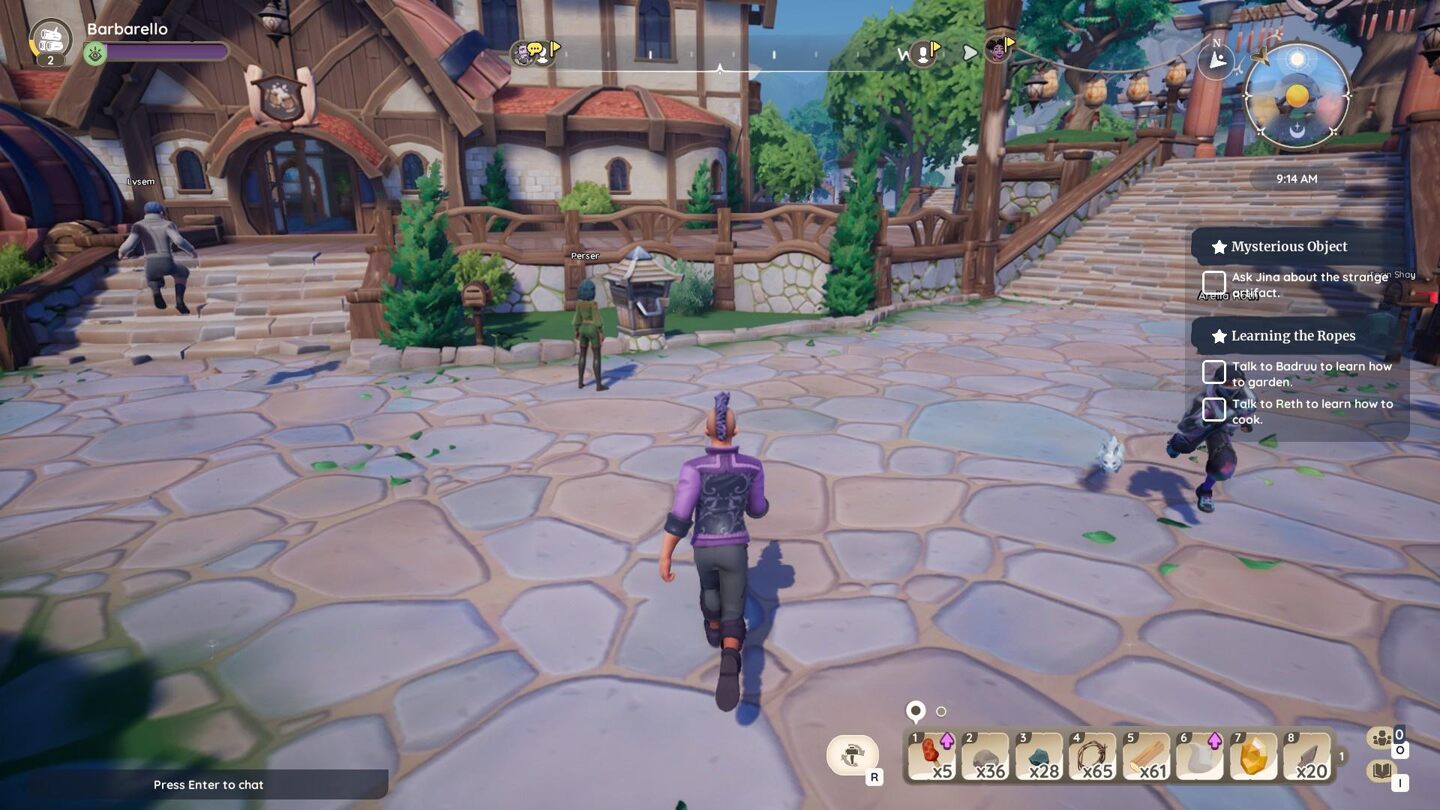
Chat is launched in a separate window and allows you to talk to someone in particular or address all of them at once. And if you approach someone else's hero, the only option is trading, i.e. exchanging items - a useful option when you lack something for construction. In principle, the same window works just for giving gifts. Have you accumulated extra? Give it to others. The rest of the multiplayer is also centered on mutual aid. For example, there are rare materials in the game, which can only be obtained together - a loner, even after finding the right resource, will not get anything. People together look for purple trees in the forest and chisel magic ore. Ordinary wood, by the way, is also faster to obtain with partners.
The second aspect of multiplayer is connected with the fact that in addition to public locations in Palia there are private, i.e. homesteads. Both regular NPCs and your friends can enter private estates, if they are invited. Your plot of land is small at first - there's barely enough space to set up a tent, a couple of machines and a giant plush toad, which is given to all newcomers. But then the space is allowed to expand, choosing the piece of forest, glade or land on the shore of the pond. And as you expand your possessions, more and more tasks appear on them, so at some point the help of your neighbors comes in handy. And you, in turn, also look to your acquaintances to help them on the gardening part or in clearing garbage, or even to see how friends decorate their homes - if you like the idea of design and it will want to apply it yourself.
The second aspect of multiplayer is connected with the fact that in addition to public locations in Palia there are private, i.e. homesteads. Both regular NPCs and your friends can enter private estates, if they are invited. Your plot of land is small at first - there's barely enough space to set up a tent, a couple of machines and a giant plush toad, which is given to all newcomers. But then the space is allowed to expand, choosing the piece of forest, glade or land on the shore of the pond. And as you expand your possessions, more and more tasks appear on them, so at some point the help of your neighbors comes in handy. And you, in turn, also look to your acquaintances to help them on the gardening part or in clearing garbage, or even to see how friends decorate their homes - if you like the idea of design and it will want to apply it yourself.
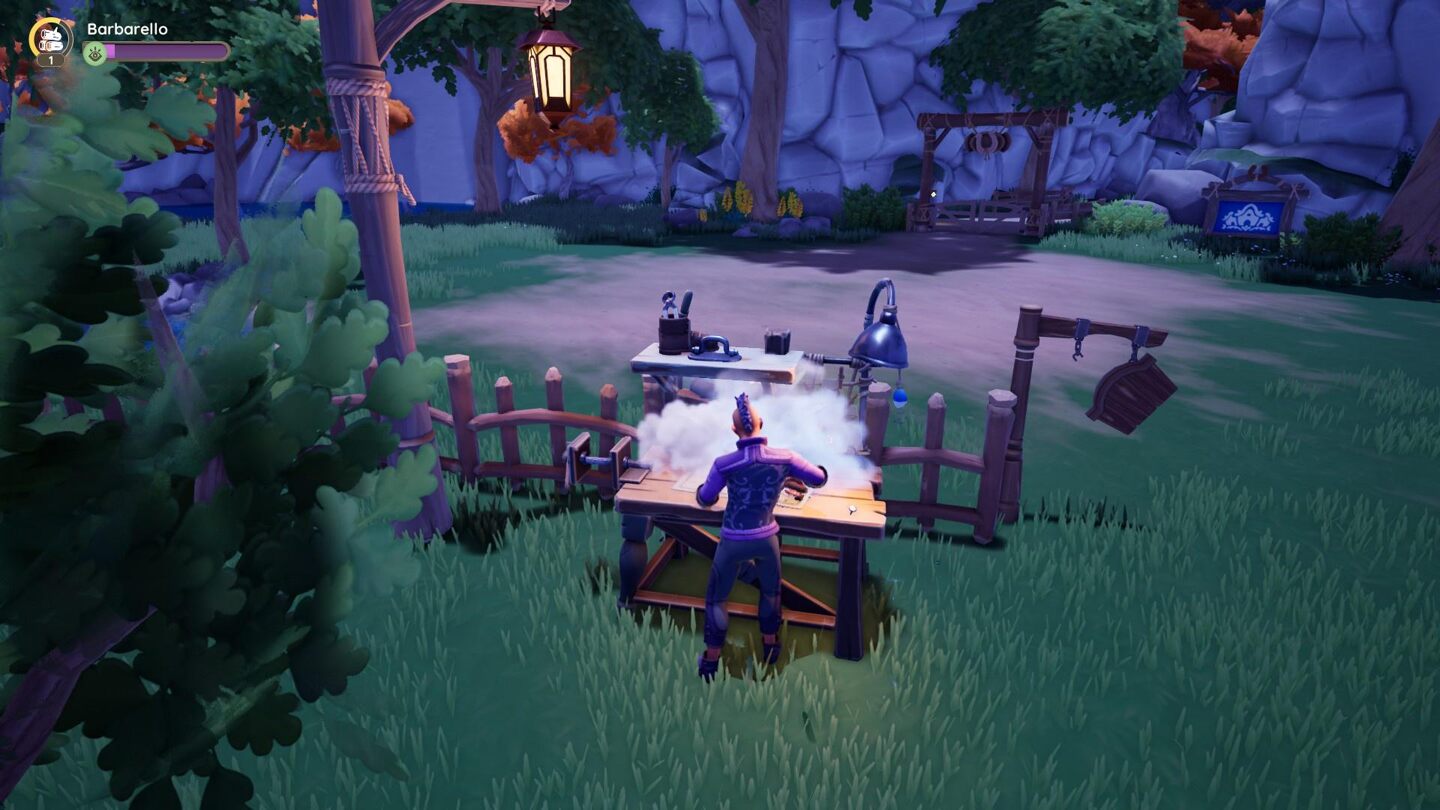
And that is, in fact, all the multiplayer activities available now. In other words, Palia is not exactly the MMO game the audience is used to. Farming simulator is combined with mechanics from Stardew Valley, Animal Crossing and other similar projects, but no PvP or PvE events. Moreover, now and then there is a limit of server connections. If you find a rare Stream Tree in a grove, you can, of course, ask someone in chat to help you cut it down, because without this wood you can't create many decorative items. But then the helpers will have to wait - and it is not a fact that they will appear at all. No one prevents you from placing an ad on the board in the hope that someone will give you the necessary items. But whether it will have an effect depends on the case. So without friends, there's basically nothing to do here.
Is there any pumping going on here?
There is no role progression here, nor are there any characteristics like strength or dexterity. And development is based on the principle of expanding opportunities: the longer you play, the more complex the available recipes and blueprints. This, in turn, affects the beauty of the manor and the ways of exploring the world. You can put more things in the house, if we used to run on foot, now we fly on a jetpack or wings, and food made with new recipes recovers faster. At the same time we accumulate virtual coins, which allow us to buy everything that is difficult to obtain or not obtained at all. The only thing you can't buy for gold is costumes. Therefore, you have to pay real money to give your character a colorful appearance.
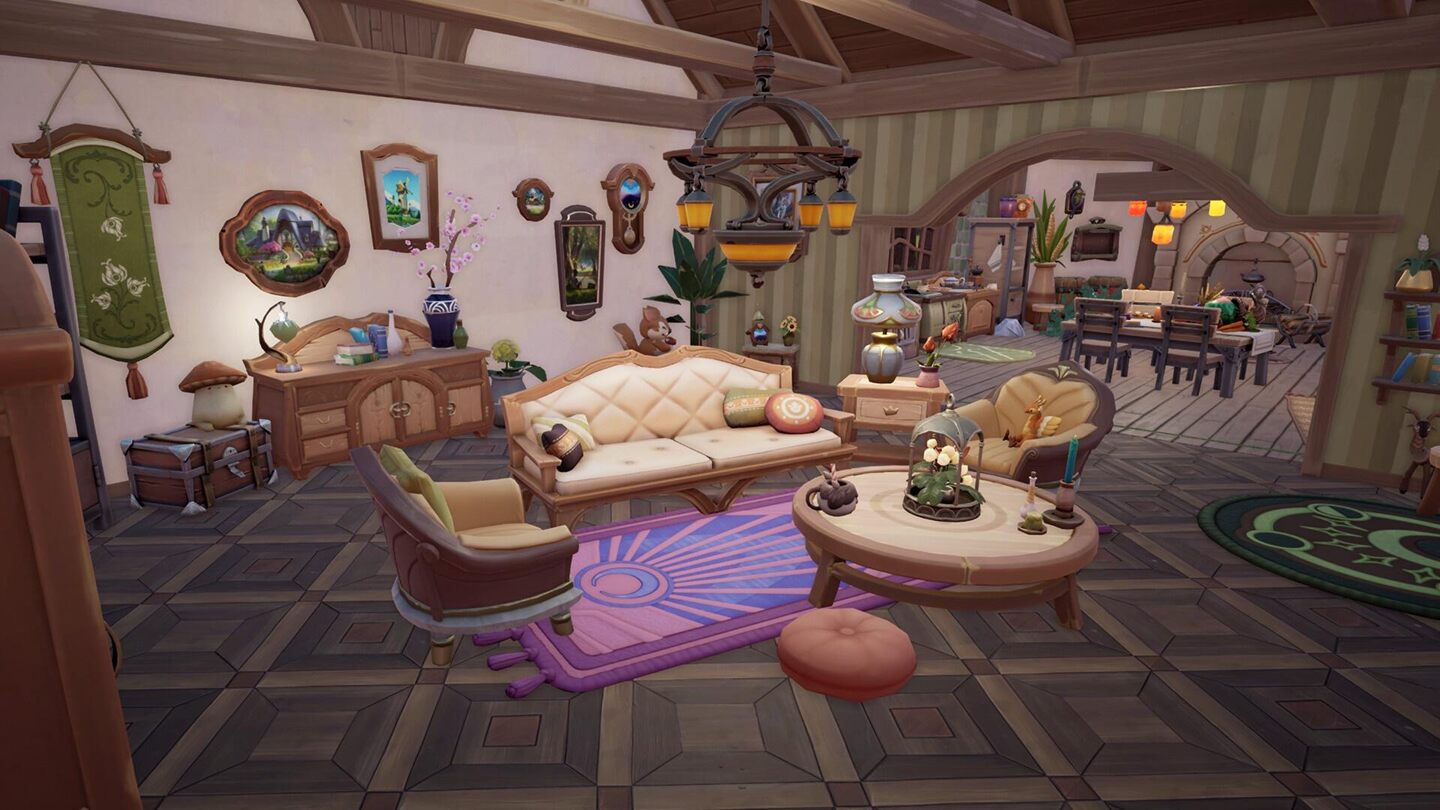
There is also a skill pump. Whatever you do, be it chopping wood, fishing, working at a workbench, cooking, or bow hunting, the skill gradually improves. And as a result, the same action takes less time in the future. For example, a beginner kills a deer with at least two shots, while a more or less experienced player only needs one. This is done on purpose so that as crafting becomes more difficult, users don't spend too much time mining for resources. And the most unusual decision is that the developers refrained from speeding up buildings for money, although in any similar game it would definitely have been provided. You can't buy bonus skill upgrades either - only jewelry items and costumes are paid in the game.
From flowers to berries
Palia looks like a white crow against the background of other online games. Its authors offer an exclusively peaceful experience, although competitions or group raids on bosses would obviously attract more people to the project. But Singularity 6 employees reject such options out of principle. Instead, they offer everyone to build their own cozy world to alternate in it adventures with a farm simulator. It's like a meditation after a hard day: dig a rock with a pickaxe, assemble a chest of drawers, complete the task of some character, check the tomatoes in the vegetable garden, cook food and go to the neighbor's house to visit - perhaps for some people this is what an ideal vacation looks like. And if such gameplay is not to your liking, pay attention to more dynamic entertainment.
Zarium. June 2024
Zarium. June 2024

